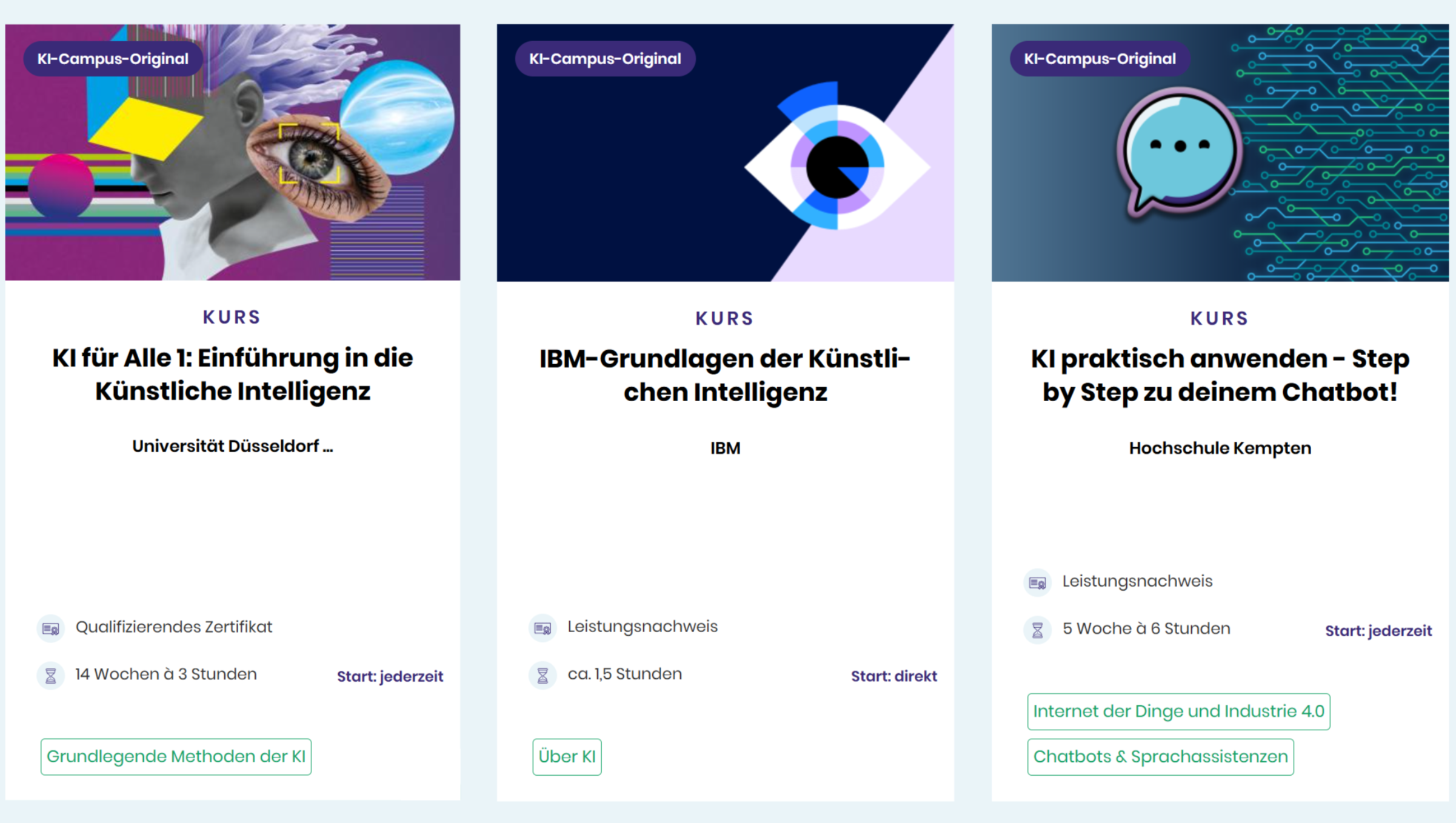AI made easy – 10 beginner courses on the AI Campus


Our learner surveys show: introductory courses are especially popular with you. However, choosing the “right” learning offer can be challenging, especially for beginners. To help you decide, we present ten introductory courses here and show you how they differ.
On the KI Campus you’ll find lots of exciting free online courses on a wide range of topics, focus areas, and applications. You can start any course at any time and build your AI skills at your own pace.
Many of you are surely already using generative AI tools in your learning and work. Of course, generative AI plays a key role in the introductory courses on KI Campus. But a look into the history and technical foundations of AI before ChatGPT and company is also an important part of learning, as it helps you better understand and contextualize current AI applications.
We begin our overview with general courses and then move on to offerings that focus on specific areas or target particular groups. No prior knowledge is required for any of the courses!
1. Introduction to AI
AI has long been part of our everyday lives — but what’s actually behind it? How does machine learning (ML) work and what new possibilities does it open up? How will AI affect our future, and why is it more important than ever to address the topic today?
Our classic among the introductory courses provides answers to these questions. “Introduction to AI” by appliedAI teaches fundamental technical concepts and explains how AI works. It’s not just about understanding AI technologies, but also about weighing opportunities and risks thoughtfully. What you learn in the course helps you better understand and apply AI in everyday life and work — and to use it deliberately and responsibly.
“Introduction to AI” is especially suitable for lifelong learners who want a broad overview of how AI works without diving into technical details.
2. AI for All
“AI for All 1” from the Heine Center for Artificial Intelligence and Data Science (HeiCAD) also offers an accessible yet comprehensive introduction. The course is ideal for students and lifelong learners who want to take a deeper dive into the topic and, in addition to general principles, build practical skills.
Especially exciting: after a theoretical introduction to the general foundations and history of AI, you can learn to program! Experiment in Jupyter Notebooks with the Python programming language and take your first steps in coding. You’ll also address ethical and legal aspects of AI and discover examples of AI in everyday life and research.
Heinrich Heine University Düsseldorf uses this course and its sequel “AI for All 2” in multiple classes to systematically strengthen AI skills among its students. Thanks to valuable feedback from previous participants, HeiCAD has further optimized both the content and technical aspects of the courses.
3. IBM AI Fundamentals
If you don’t have time for long online courses, check out IBM SkillsBuild’s fundamentals series. In the first course, you’ll get a solid introduction to AI in less than two hours. You’ll get a compact overview of the history of AI, easy-to-understand explanations on AI technologies, and practical examples showing where you’ll encounter AI in everyday life.
It’s worth completing all six courses in the series, which will be released by the end of May. If you do, you’ll receive, in addition to individual course certificates, a Micro-Degree from IBM and KI Campus!
4. Data Literacy course series
Data is the most important foundation of AI. That’s why data skills (aka data literacy) are an essential component of AI skills and a prerequisite for participating in social and professional life.
Data literacy encompasses the ability to collect, manage, assess, and apply data in a critical way. Like reading and writing, data skills are now an indispensable part of general education.
For anyone who wants to learn more about data and how to handle data competently, the Data Literacy course series from TH Köln is a great choice. You can also earn a Micro-Degree for this series.
5. Methods of Bias Reduction for Socially Responsible AI Design
AI biases are stereotypical distortions that often arise from the data used to train AI systems. Are you wondering how such biases can be identified and avoided?
In this course, part of the series on socially responsible AI design from Heilbronn University, you’ll learn about proven de-biasing methods. These scientifically grounded methods are already being applied successfully in many areas. The aim is to ensure that AI systems are not only technically capable, but also fair and transparent.
Through practical examples and small exercises, you’ll get a toolbox you can use to responsibly use and help shape AI systems.
6. Applying AI in Practice – Step by Step to Your Own Chatbot!
Biases are increasingly relevant as we interact more naturally with chatbots. But how do chatbots actually work? Find out by building your own chatbot on KI Campus!
The course "Applying AI in Practice – Step by Step to Your Own Chatbot!" from Kempten University was recently updated. Explore how natural language processing (NLP) works, what AI agents are, what types of chatbots exist, and what sets generative AI chatbots like ChatGPT apart.
With learning by doing, you’ll put theory straight into practice and develop an intuitive understanding. No programming skills are required — just jump in for an exciting learning experience!
7. School Gets AI
This course is aimed at teachers and teaching students, especially those from non-STEM subjects in secondary education (grades 5–13). With "School Gets AI," you’ll learn in just a few hours how to explain AI tools in the classroom.
No prior knowledge of AI? No problem! The course is well-suited for teachers for whom AI is still uncharted territory.
Junge Tüftler and Fraunhofer IAIS give you a playful introduction to the basics of AI and machine learning. You’ll explore the relevance and opportunities of current AI applications in your students’ daily lives and learn methods to help them use generative AI tools critically and independently.
8. AIce Your Exams – Generative AI as Copilot in School and University Life
According to the FAZ, “AIce Your Exams” is one of the best introductory courses on generative AI. Developed and delivered by students at the Technical University of Munich, the course focuses on relevant applications of generative AI in academic settings and its use for personal learning in school and university.
You’ll dive into prompt engineering for tools like ChatGPT and learn diverse methods to improve language model outputs for your own everyday use. The course also covers the impact of generative AI on learning and society.
9. Prompt Lab Higher Education 2.0
How do generative AI tools work, and what makes them different? What can I use prompting for in teaching and exams, and what should I keep in mind? How do I know if my prompts yield high-quality results? How can I create my own GPTs?
The Prompt Lab by KI Campus and the Hochschulforum Digitalisierung (HFD) shows university instructors how to evaluate, select, and use generative AI tools productively for their purposes. You’ll learn to assess how generative AI works, its limitations, and its risks based on practical examples from higher education.
In addition to the online course, we offer, together with HFD, the “Prompt Retros”, an online event series for direct exchange around prompting in higher education teaching.
10. Dr. med. AI – Basics
AI is also becoming increasingly relevant in the field of medicine. AI is used in symptom checker apps, in disease detection, and even in operating rooms. In “Dr. med. AI” from Charité and the Stifterverband, you’ll find answers to questions such as: What does generative AI mean for medicine? Why is data so important? How can AI assist in better diagnoses of diseases like cancer? Ethical and legal questions are also covered.
Our courses in the “Dr. med. AI” series are even recognized by medical boards and used for medical continuing education. But don’t worry — the basics course is easy to understand even without medical knowledge and provides fascinating insights for anyone interested in the use of AI in medicine.
Selecting the Right AI Course and Earning a Certificate
We hope our ten highlights make it easier for you to embark on your learning journey on KI Campus. One last tip: all courses provide certificates that you can use, for example, as proof of your AI skills in your CV. We’re always delighted when you share your certificates and transcripts on LinkedIn — so we can celebrate your learning success together!

Lucas Laux is responsible for public relations for the AI Campus and the ‘Future Skills & AI’ programme area at Stifterverband. He studied media studies at Humboldt University in Berlin (M.A.) and at the University of Passau (B.A.). Previously, he worked for several creative agencies in the field of PR and corporate communications. His focus is on topics at the intersection of technology, education and culture.
